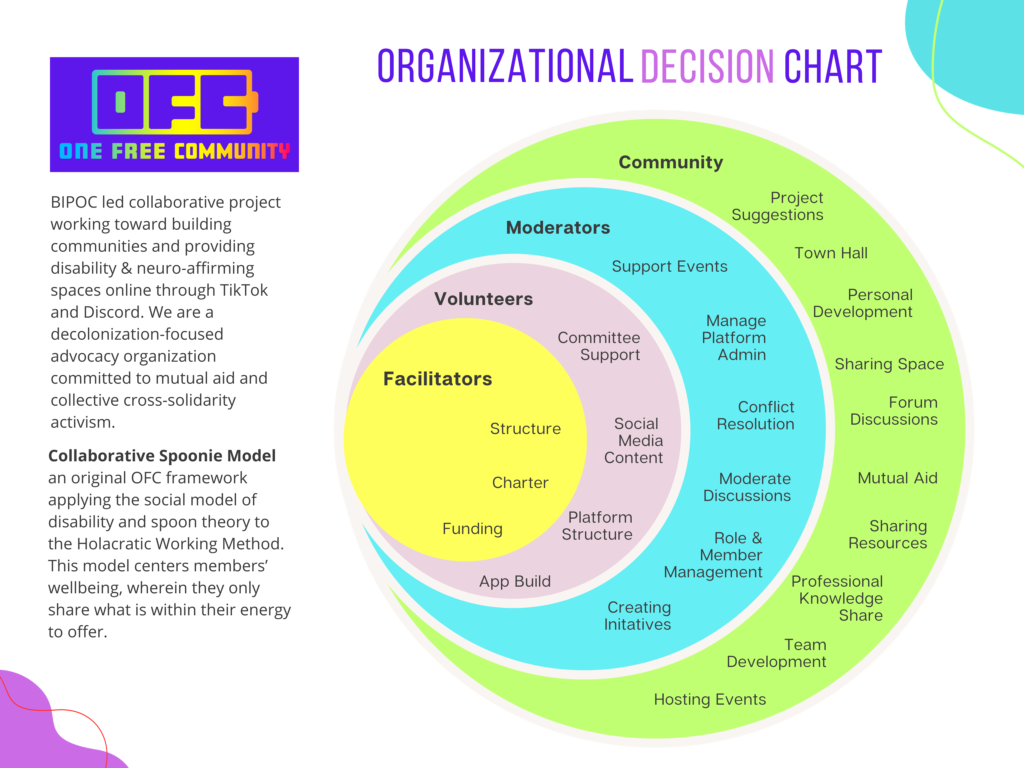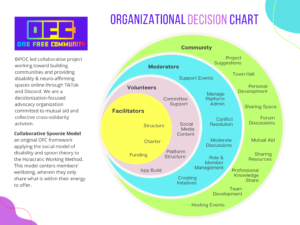Term coined at One Free Community
Collaborative Spoonie Model is an original One Free Community (OFC) framework applying the social model of disability and spoon theory to the holacratic working method. This model centers members’ wellbeing, wherein they only share what is within their energy to offer. In social justice, prioritizing well-being, guided by disability justice, ensures sustainable movement building by respecting energy levels and fostering inclusion.
Organizing
The Holacratic Working Method decentralizes authority into self-organizing teams rather than a management hierarchy. It is designed to distribute authority and decision-making throughout an organization. Holacracy relies on self-organizing teams and a system of “circles,” each with specific roles and responsibilities. This approach aims to create a more adaptive and flexible organization by promoting autonomy, transparency, and continuous improvement. It emphasizes a shift away from traditional top-down management in favor of a more dynamic and responsive organizational structure.
Honoring
The Social model of disability centers people who are disabled by lack of accessibility and inequity in systems. The medical model views disability as an individual deficit or impairment. It focuses on the medical condition itself and often prescribing medical interventions or treatments to “fix” it. In contrast, the social model honors that disability is not solely a result of an individual’s impairment, but is significantly shaped by societal structures, attitudes, and barriers. It emphasizes the need to eliminate social, environmental, and attitudinal barriers to ensure equal opportunities and inclusion for disabled people. By shifting the focus from the medical condition to the broader social context, the social model advocates for systemic changes to create a more accessible society.
Acknowledging
Spoon theory is a metaphor explaining the limited energy or capacity of people with chronic illnesses or disabilities have for daily activities. The concept was developed by Christine Miserandino. In the metaphor, spoons represent units of energy. Each activity, whether simple or complex, requires a certain number of spoons. Once a person runs out of spoons, they may not have the energy to engage in additional activities. It provides a tangible way for us to communicate the challenges of managing our energy levels and highlights the importance of prioritizing activities based on available resources.
Sustaining
At OFC, we center self-care to ensure everyone participating in projects and community events while honoring their capacity. The entire community is run by queer disabled volunteers offering their time and spoons to help each other. Self-care is intrinsically tied to community care. It forms a symbiotic relationship that contributes to the overall well-being of each person and the community at large. When we prioritize our own mental, emotional, and physical health through self-care practices, we are better equipped to engage in meaningful and sustainable community efforts. This, in turn, enhances the collective strength of the community. Moreover, community care involves creating an environment that supports and encourages self-care. A community that values and promotes the well-being of its members fosters resilience, empathy, and a shared commitment to social justice. In essence, the intertwining of self-care and community care creates a powerful foundation for building more compassionate and sustainable communities.
Collaborating
In collaborative social justice projects, centering the well-being of individuals is essential for sustainable movement building. Guided by the 10 principles of disability justice, our community emphasizes intersectionality and interconnectedness. Recognizing the variability in individuals’ energy levels or spoons over time is essential, necessitating us honoring our capacity and allowing flexibility in commitments. Respecting individuals’ energy levels and allowing them to work at their own pace challenges the urgency and perfectionism associated with white supremacy culture. By creating an inclusive environment that values diverse working styles, organizations actively dismantle harmful norms perpetuated by this culture.

The Collaborative Spoonie Model ensures that members can contribute while considering their well-being, respecting each individual’s unique circumstances. By recognizing and promoting autonomy and flexibility within teams and decentralization of authority, each group can complete projects at a pace that works for them. Focusing on dismantling societal barriers and communicating our needs creates an inclusive framework for collaborative community work, contributing to our success.
About the Author
Jesenia, a collaborator with Calling Up Justice and cofounder of One Free Community, is working to build a more equitable and inclusive world via collective action by building communities. Learn more on her Website or Read Jesenia’s Bio.
About One Free Community
One Free Community is A BIPOC- and neurodivergent-led, collaborative project working toward building the most accessible, functional, and inclusive mutual aid network the world has ever seen.

